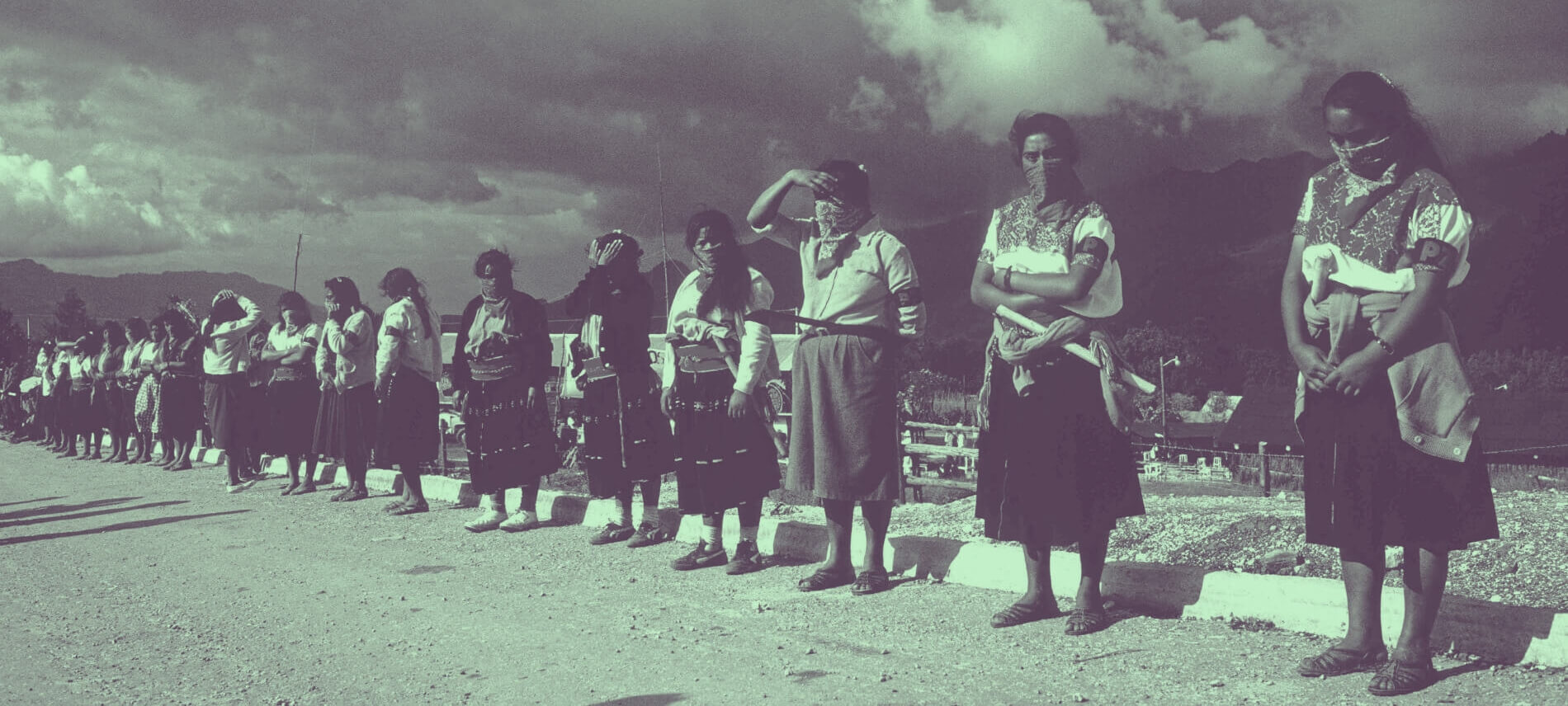
The Indigenous Rights Report is a weekly crash course on everything in the indigenous world.
Make this podcast happen! Support us on Patreon!
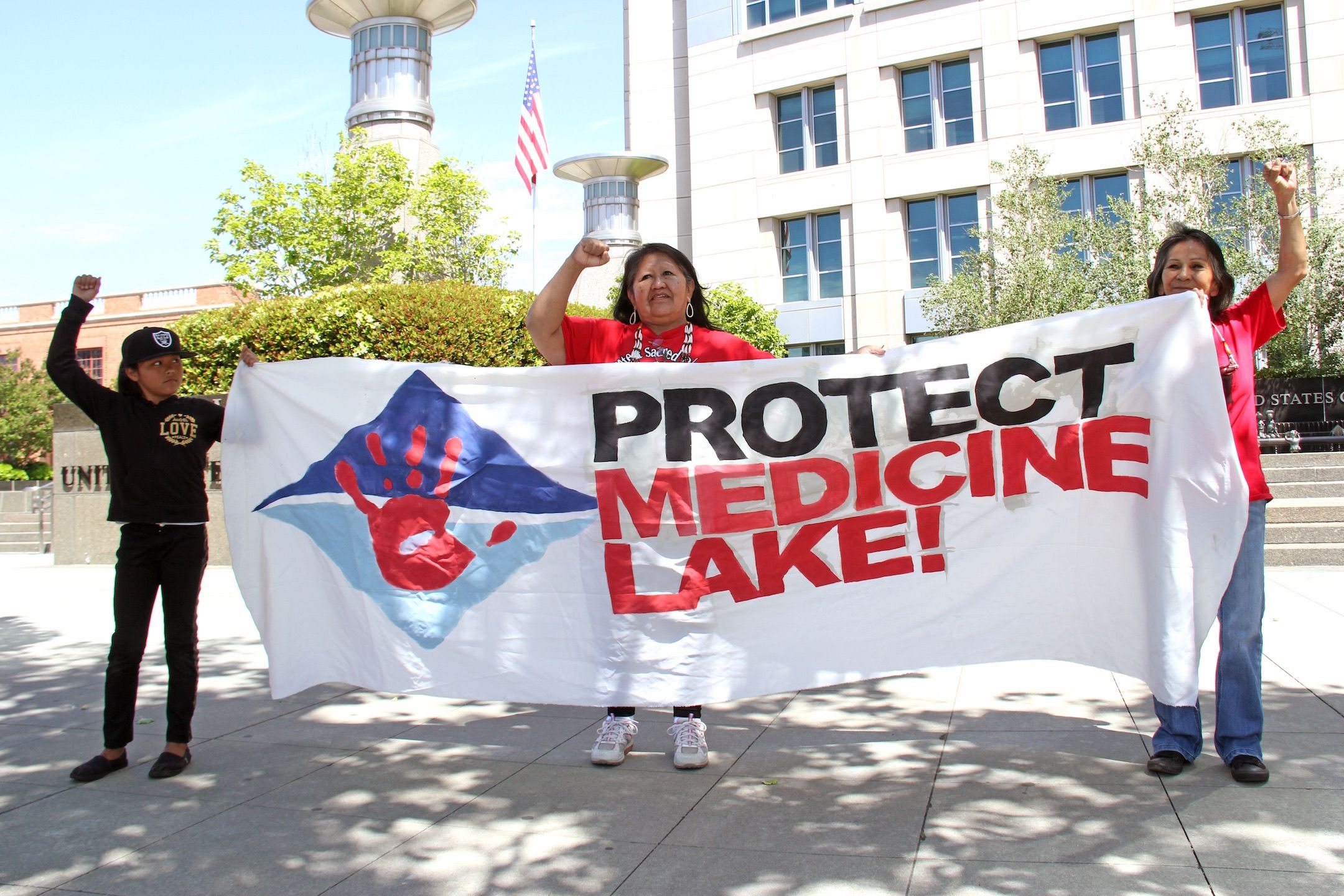
This is the Indigenous Rights Report for the week of September 21, 2019. In this week’s report:
- ‘We can’t pray to the god of oil palm’, cry Indonesia’s Indigenous tribes
- Pit River Tribe proclaims victory in the fight to protect Medicine Lake Highlands
- Brazilian Indigenous leaders denounce Bolsonaro before UN speech
- Another stolen generation looms unless Indigenous women fleeing violence can find safe housing
- Amazonian community takes land rights struggle against oil palm expansion to Peru’s highest court
- 28 of those arrested at TMT protest plead not guilty
- Brazil to push forward mining on Indigenous land amid opposition
- The Shuar Arutam Peoples of Ecuador declare territory free of mining; reject FPICs
- Mi’kmaw harvester ID cards called a step toward self-governance
- Blackfeet Nation to host first-ever Murdered and Missing Indigenous Women tribunal in the U.S.
- Indigenous community to declare itself an autonomous Indigenous municipality
- Oglala Sioux Tribe passes hate crime law protecting its LGBTQ citizens
- Oil palm, cattle and coca take a toll on Colombia’s Indigenous Jiw
- Indigenous representative joins UN climate summit: ‘They need us’
- Indigenous people lead march of 250,000 in NYC climate strike
- Palm oil, pineapples threaten Southeast Asia’s Indigenous lands
- National Park Service (NPS) begins to document Indigenous knowledge
- Quebec Crown still silent on 55 complaints from Indigenous people of police abuse
- The Klamath River now has the legal rights of a person
- Native Hawaiians join call for global Indigenous representation in ocean research
- Is your Thai holiday resort built on Indigenous land?
- Indigenous knowledge helps puts industrial pollution in perspective
A damning report by Human Rights Watch highlights the Indonesian government’s failure to protect the rights of Indigenous peoples who have lost their traditional forests and livelihoods to oil palm plantations in West Kalimantan and Sumatra’s Jambi territory. The report entitled “‘When We Lost the Forest, We Lost Everything’” highlights how a combination of “weak laws, poor enforcement and the failure of oil palm plantation companies to fulfill their human rights responsibilities have adversely affected Indigenous peoples’ rights to their forests, livelihoods, food, water, and culture.” The report focuses specifically on the plantation operations of two palm oil companies that have severely impacted the rights of the Iban of West Kalimantan (who are related to Malaysia’s Iban community) and the Orang Rimba, a semi-nomadic, forest-dependent Indigenous peoples in central Sumatra.
In May 2013, the Indonesian Constitutional Court handed down a landmark judgment that granted Indigenous peoples rights to their customary forests; but very little has been done to identify or protect these lands. Between 2001 and 2017, Indonesia lost 24 million hectares of forest cover, an area almost the size of the United Kingdom. Deforestation on such massive scale threatens not only the well-being and culture of the Indigenous populations, but also has global significance associated with climate change, said the report. Indonesia now has about 14 million hectares of land planted with oil palm.
The 9th U.S. Circuit Court of Appeals declared a victorious win for the Pit River Tribe and other Indigenous Nations in a decades-long dispute over geothermal leasing on federal land within California’s sacred Medicine Lake Highlands. The court issued a summary judgment by the panel ruling in favor of Indigenous peoples and environmental groups in their action against federal agencies responsible for administering twenty-six geothermal leases located in Medicine Lake Highlands. These leases threatened to desecrate and industrialize the pristine and rugged sacred landscape. This is especially egregious due to the lack of scientific evidence of the effectiveness of the proposed method of geothermal steam extraction to produce energy.
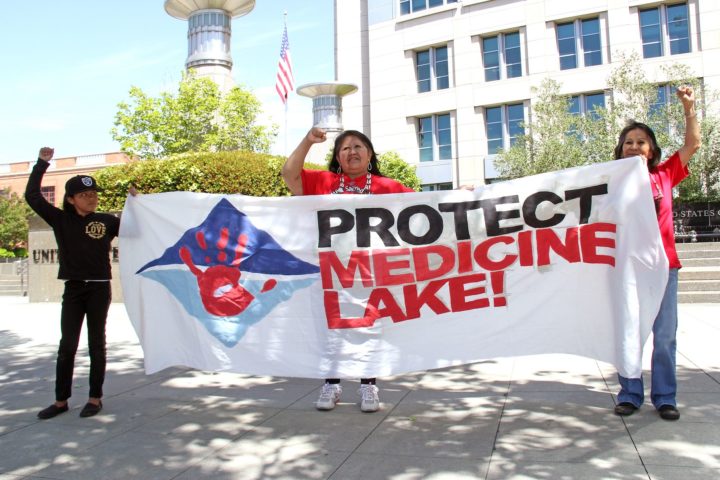
Photo: Twitter
The historic win for California tribes is part of a long struggle for basic recognition and protection of Indigenous territories. The Medicine Lake Highlands are held sacred by the Pit River Nation as well as many other Tribal nations which include the Wintu, Karuk, Shasta, Klamath, Yana, and Modoc peoples.
Indigenous leaders in Brazil have denounced Jair Bolsonaro’s “colonialist and ethnocidal” policies as the far-right populist headed to New York to defend his treatment of the Amazon and its inhabitants. In a strongly worded open letter, 16 Indigenous leaders from Brazil’s Xingu Indigenous park spurned Bolsonaro’s “colonialist and ethnocidal” programme for their communities, which he has pledged to open for commercial exploitation. Jair Bolsonaro has also come under fire for his pro-development policies that have been seen as giving license for the land-clearing that started many of the blazes currently burning. Over the past 50 years, around 17% of the Amazon rainforest has been destroyed, much of that due to deforestation in favor of agricultural production. Indigenous chief Raoni Metuktire, proposed for the Nobel Peace Prize, said his people would not leave the Amazon and called on Brazil President Jair Bolsonaro to step down, a day after the head of state accused him of being a pawn of foreign interests.
In Western Australia more than half the children placed in state care are Aboriginal. The state government committed this month to reducing this over-representation, in a move that parallels the Closing the Gap Refresh draft target nationally.
Despite concerns about another stolen generation, Australia has yet to act on a root cause – the difficulty Indigenous women escaping family violence face in finding safe housing. Domestic violence and housing are linked as a cause of child removal. Child removal often has severe mental and physical health effects, with risks of substance use, homelessness and incarceration. This issue is not primarily one of isolated remote communities. The rate of Indigenous children in out-of-home care is highest in major cities. As Indigenous policy is realigned under the Closing The Gap Refresh, the Australian government is being told that it must act by increasing the number of crisis beds and consider goals to reduce the number of Aboriginal women and children turned away from crisis accommodation.
Peru’s Constitutional Tribunal will hold a hearing with implications for the future of the Amazon rainforest, Indigenous peoples’ rights, and the fight against climate change. The case has been brought by an Indigenous community against the Regional Government of Ucayali and a palm oil company, Plantaciones de Pucallpa SAC (now Ocho Sur P), to demand land titling, more than seven years after they were dispossessed of significant parts of their traditional territory. The community of Santa Clara de Uchunya forms part of the Shipibo-Conibo people and is located on the banks of the Aguaytia River in Ucayali, Peru. Its people are also calling for the restoration of their lands, which have become a deforestation hotspot following the conversion of over 7,000 hectares of forest to palm oil plantations.
This is the first time the Tribunal will resolve a case involving Indigenous Peoples’ rights over their territories and the Peruvian Government’s failure to title them.
Twenty-eight of the 38 people arrested during the first week of the Thirty Meter Telescope protest in July plead not guilty during their first appearance in court. Attorneys for several defendants said they were basing their not guilty pleas on their right to freedom of religion, which is protected under the Constitution.
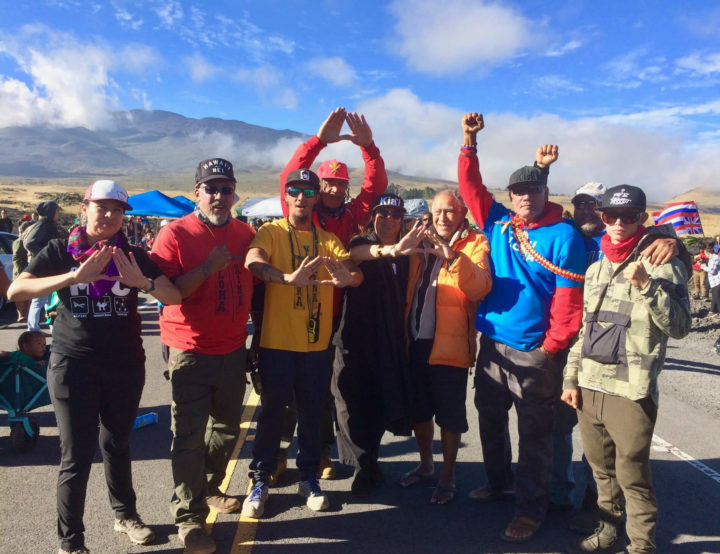
Leaders of the movement to protect Mauna Kea. (Photo by Anne Keala Kelly)
In a Hilo courtroom, each defendant ― most of whom are kupuna ― faced the judge on charges of obstruction, which is a misdemeanor crime. The next step for the group: Scheduling individual trials for every one of the defendants.
The Brazilian government is pushing ahead with a controversial bill that allows mining activity on Indigenous lands, and it won’t give local communities any veto power, a cabinet member said. The private sector will naturally refrain from exploring in areas if Indigenous groups are against it, Alexandre Vidigal, the mining secretary at the Energy Ministry, said in an interview. “It is obvious that if an Indigenous community opposes a certain mining activity, there won’t be an entrepreneur interested in developing it,” he said on the sidelines of an event in Rio de Janeiro.
The Shuar Arutam Peoples of Ecuador recently came together to analyze a response to the systematic violation of their collective rights by the State and the mining companies that have been operating in their ancestral territory. They ultimately decided to take a number of actions to protect their land and their constitutional right to self-determination.
Shuar Arutam will now demand that all large-scale mining concessions developing in their territory be withdrawn immediately because they have been made without consulting them. Further, they will demand compensation for damages to their territory; refuse any future “prior-consultation” proceedings; and require the State to guarantee their rights as framed in their life plan.
The Assembly of Nova Scotia Mi’kmaw Chiefs has created a new system for identifying who has treaty hunting and fishing rights in the province. Mi’kmaw who qualify can now apply for a new harvester identification card. Paqtnkek Chief Paul Prosper, justice lead for the assembly, said the enrolment process is not just a way to get a hunting licence. He said it’s an important step toward self-governance. For years, the chiefs were concerned about people self-identifying as Mi’kmaw or using identification cards issued by the Native Council of Nova Scotia to exercise treaty hunting rights. The new harvester identification cards allow Mi’kmaw who are non-status or on the Atlantic General List to exercise treaty hunting and fishing rights. However, the harvester identification cards have no bearing on band membership, he said.
Nova Scotia’s Department of Lands and Forestry, which sets provincial hunting regulations, said it is in the process of updating its policies to accept the new harvester identification cards.
The Blackfeet Nation will host the first-ever Murdered and Missing Indigenous Women (MMIW) tribunal in the US on October 4 and 5 at the Blackfeet Community College in Browning, Montana. The two-day Blackfeet MMIW Tribunal will record public testimony from MMIW survivors and victims’ families, as well as provide private sessions for witnesses who may be hesitant to share their accounts in a public forum.
The Blackfeet Tribe (Amskapi Pikuni), a member of the Blackfoot Confederacy along with its three sister tribes – the Piikani, Blood and Siksika, located in Alberta, Canada, stands in solidarity in combatting the issue of MMIW (MMIP) in Indian country.
Yucuquimi village of Ocampo in the Mixteca region of Oaxaca has announced their intent to declare autonomy due to conflicts facing the municipality of Tezoatlán de Segura y Luna, the Indigenous Zapatista Agrarian Movement (MAIZ) reported. In this context, the members of the MAIZ denounced the entry of the army to Yucuquimi de Ocampo on September 22. Misael Velásquez Tadeo of MAIZ said that, on October 12, the community of Yucuquimi de Ocampo will be declared autonomous and will begin its corresponding procedures before the State Congress, within the framework of the Day of Indigenous Resistance.
The Oglala Sioux Tribe may be the first Indigenous nation to pass a hate crime law providing protections for LBGTQ and two spirit people, but citizens remain divided over decision.
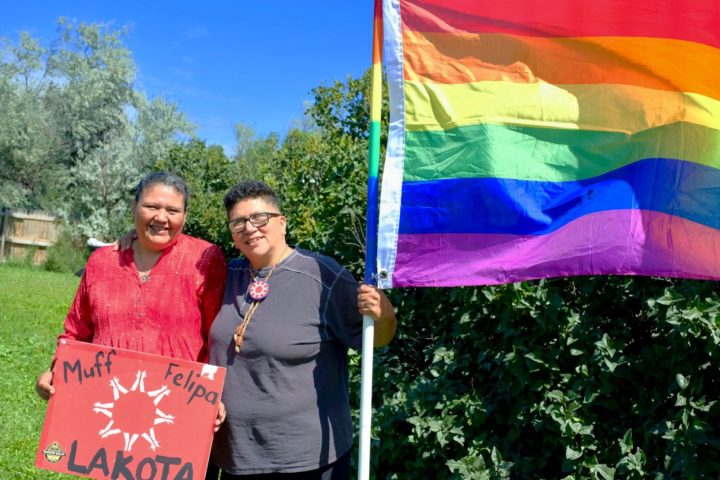
Monique “Muffie” Mousseau and Felipa DeLeon, both citizens of the Oglala Sioux Tribe helped forward the effort to change their tribe’s marriage law. Photo courtesy Mary Annette Pember
The tribe’s path to passing its hate crime law as well as a law recognizing same-sex marriage mirrors debates happening all over the United States as communities wrestle with responses to gender-fluid citizens’ calls for acceptance and protection. Under tribal law, hate crimes are now punishable by up to one year in jail, a fine and/or restitution.
In the Caño La Sal reservation in central Colombia, the Jiw Indigenous community lives on a shrinking amount of land. Several armed groups have begun taking over their territory to grow oil palm and coca and to raise cattle. The residents of Caño La Sal, in Puerto Concordia municipality, are experiencing water shortages and food insecurity due to the growth of oil palm as a monoculture. In response, the Constitutional Court of Colombia prepared a list of 34 ethnic groups, including the Jiw community, at risk of disappearance. “The Caño La Sal reservation is exposed to the dynamics of armed groups and the dispossession of their territorial rights, which could lead to the physical and cultural extinction of the ethnicity. The priority of the institutions should be to guarantee them their land,” said Ana María Jiménez, the defense lawyer for the people of Meta.
The Ombudsman’s Office of Colombia warns that the precarious government presence in these rural areas, combined with the vulnerability of the Jiw community due to their “relatively recent contact with Western culture,” facilitates the actions of illegal groups aiming to impose their own models of social, economic, and political power.
At the UN climate action summit, for the first time, an Indigenous representative joined the event in a formal capacity. Tuntiak Katan of the Ecuadorian Shuar people spoke on behalf of the International Indigenous People’s Forum on Climate Change (IIPFCC), a caucus of Indigenous rights advocates who, for years, has been working towards more robust participation and inclusion at the UN level in response to the climate crisis – even more so after the importance of traditional knowledge was mentioned in the 2015 Paris accord. In his address, Katan outlined three climate action commitments of the IIPFCC as requested by the UN secretary general. Of these steps, the Indigenous rights leader who also serves as vice-president of Coordinator of the Indigenous Organizations of the Amazon River Basin (Coica), emphasized most the need for Indigenous inclusion. “We are more than 400 million Indigenous peoples in the world and we protect 80% of the world’s biodiversity,” Katan said.
Formal Indigenous representation has chronically been absent at UN climate talks even though Indigenous peoples have been voicing concerns about a warming planet for decades. Monday’s summit represented the most visible commitment made by the UN in promoting Indigenous inclusion in high-level climate conversations and advanced progress from the historic working group formed at COP24 in Poland last year.
Many Indigenous people came to New York City to make their demands known before the UN Climate Action Summit. A large contingent of Indigenous Brazilian leaders and pro-democracy Brazilian activists highlighted the current genocide occurring in the Amazon as wildfires are used to clear land for agri-business interests.
The day of global strike hit corporate pollution of the earth, the profits over people policies of the military and businesses, and the lack of political will of many governments to seriously take on these issues.
Palm oil plantations in Indonesia and commercial fruit orchards in the Philippines have uprooted Indigenous peoples and rural communities from their land, despite laws put in place to protect them. What’s more, according to Global Witness, powerful businesses, corrupt officials and paramilitary groups are fueling violence against rural communities in the Philippines. “International companies are still not carrying out proper due diligence to avoid conflicts – particularly in countries like the Philippines, where laws protecting land and Indigenous rights are often not enforced.” The human rights group earlier this year said the Philippines was the deadliest country in the world for land rights activists in 2018, with killings spiking under President Rodrigo Duterte.
Globally, Indigenous and local communities own more than half of all land under customary or traditional rights. Yet, they have legal rights to only about 10 percent, according to the Washington-based advocacy group Rights and Resources Initiative.
The National Park Service (NPS) has established an Indigenous knowledge desk across in its seven national parks and the headquarters to generate and document relevant Indigenous knowledge that will aid in biodiversity conservation in the country. Conservator-General of NPS, Ibrahim Goni, said in a statement that the documentation is to include population growth and unsustainable resource consumption to curb the menace of climate change and global warming, invasive alien species, over-exploitation of natural resources and land degradation. “To curb the menace of these environmental challenges, the management must integrate Indigenous knowledge as a means to complement conservation efforts already established,” he said.
The head of an association representing Indigenous women in Quebec is asking why people who lodged complaints of police abuse more than three years ago are still waiting to hear if criminal charges will be laid. “It’s far too long,” said Viviane Michel, president of Quebec Native Women.
Following an explosive Radio-Canada report in 2015 alleging provincial police officers in Val-d’Or, Que., had abused Indigenous women, then-public security minister Martin Coiteux gave the Montreal police service (SPVM) the mandate to investigate all allegations of criminal behavior by police in their dealings with Indigenous people in the province.
The Yurok Tribe declared rights of personhood for the Klamath River — the first to do so for a river in North America. A concept previously restricted to humans (and corporations), “rights of personhood” means, most simply, that an individual or entity has rights, and they’re now being extended to nonhumans. With the declaration, the Yurok Tribe joins other Indigenous communities in a growing Rights of Nature movement aimed at protecting the environment. “By granting the rights of personhood to the Klamath River, not only does it create laws and legal advocacy routes, but it’s also an expression of Yurok values,” says Geneva Thompson, associate general counsel for the tribe and citizen of the Cherokee Nation, who worked on the resolution. The resolutions give tribal nations new legal strategies for use in court, especially in regards to climate change.
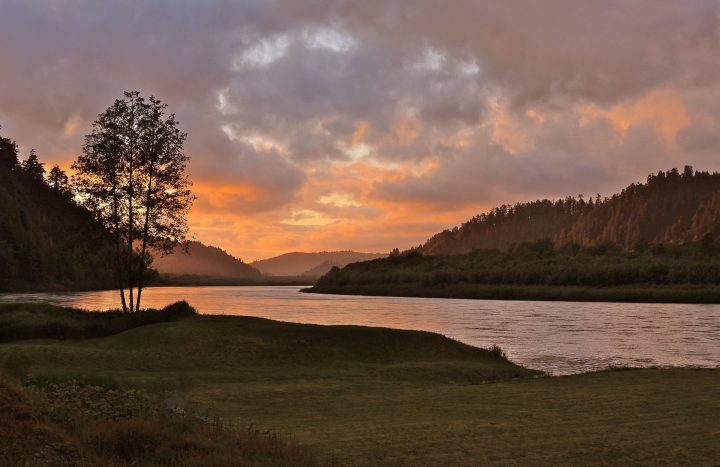
Sunset On The Klamath River. Photo: Linda Tanner/flickr. Some Rights Reserved
Rights of nature have already been established in Colombia, Ecuador and India, with varying success, and have also appeared in non-Native communities in the U.S.
Native Hawaiians called on the ocean sciences community to recognize the valuable knowledge Indigenous peoples can bring to their research. During OceanObs, a global ocean observation conference held at the Hawai’i Convention Center, where more than 1,400 delegates from 63 countries met to discuss and set priorities for the next 10 years of oceanographic research, Indigenous delegates presented the Aha Honua Coastal Indigenous Peoples’ Declaration to ask scientists and policymakers to establish meaningful partnerships with Indigenous communities to share knowledge and resources.
“There’s a whole system of knowledge that is ignored primarily by the scientific community. That is important,” said Charles Kaaiai, one of the Indigenous delegates from the Pacific Islands. “It’s detailed, it’s site specific, it’s comprehensive, it’s cohesive, and it contributed to the survival of Indigenous cultures of the world.”
Thailand’s Indigenous peoples risk losing more of their land to hotels and national parks amid an unchecked tourism boom that has marginalized them, human rights groups warned. As demand for land for hotels and other tourism facilities grows, authorities are targeting Indigenous land, said Emilie Pradichit, director of human rights group Manushya Foundation, which published a report on Thai Indigenous rights. “Indigenous people do not have legal recognition of their collective and individual land and resource rights, so they are often subject to forced evictions. Authorities promise them jobs in the tourism industry, but these do not compensate for the loss of their land,” she said.
There are about 6 million Indigenous peoples in Thailand, making up over 9% of the country’s population.
With the help of two Indigenous communities, researchers recently investigated how climate change is affecting the sequestration of decades-old mining by-products in Canadian lakes. The researchers honed in on Giant Mine, once among the world’s most productive gold mines. During its earliest days in the 1940s and 1950s, Giant Mine’s smokestack was pumping out as much as 7,400 kilograms of arsenic each day, without any environmental protection or regulation. Almost immediately, it affected people who lived nearby. Fish caught in certain lakes were linked to arsenic poisoning. Local precipitation was so contaminated that in 1951, a child died after eating snow riddled with arsenic.
Some of the arsenic released by Giant Mine was sequestered in sediments on lake bottoms, and climate change could cause it to be released. Over three years, researchers worked with the Yellowknives Dene First Nation and North Slave Métis to better understand the region’s ecological history and help determine the risks.
This is the Indigenous Rights Report.

Indigenous Peoples are putting their bodies on the line and it's our responsibility to make sure you know why. That takes time, expertise and resources - and we're up against a constant tide of misinformation and distorted coverage. By supporting IC you're empowering the kind of journalism we need, at the moment we need it most.